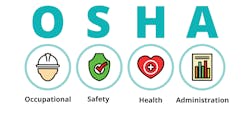The Occupational Safety and Health Administration (OSHA) is under an ongoing attack in the courts and the media, being accused of not doing enough to adequately address the failure of some employers to deal properly with the Coronavirus pandemic in their workplaces.
One particular complaint is that the federal agency has failed to issue an emergency temporary standard (ETS) to deal with the disease. States that administer federal OSHA rules—26 in all—also have the authority to issue such emergency regulations on their own, and some are starting to do so.
In spite of Virginia crowing about being the first state in the nation to create such an emergency rule, when it was announced on July 15, the state of Washington already had issued an emergency rule applying to workplaces in May. Oregon is said to be developing its own set of rules, which are expected to be released at the beginning of September.
“In the face of federal inaction, Virginia has stepped up to protect workers from COVID-19, creating the nation’s first enforceable workplace safety requirements,” declared Virginia Gov. Ralph Northam (D) on July 15—vividly illustrating the political nature of the action taken in the midst of a contentious election year.
The state’s emergency rule covers many of the same topics OSHA has developed in a series of detailed guidances and frequently-asked-questions addressing the Coronavirus. The federal agency guidances have continued to evolve since the pandemic began and were developed with the assistance of the Centers of Disease Control and Prevention (CDC). Some of them target specific industries while others are aimed at employers in general.
The Virginia rule includes a provision protecting employers who comply with CDC guidelines that deal with mitigation of COVID-19 in the workplace. It also requires employers to analyze job tasks on a task-by-task basis rather than on an employee-by-employee basis.
If employers in Virginia are found to be complying with CDC guidelines, the state will deem them to be in compliance with its emergency rules—which undermines Northam’s charge that the state had to act because the federal government has been inactive. Virginia employers who are found not in compliance can face fines up to $12,726 for serious violations and $127,254 for willful violations.
The AFL-CIO filed suit against OSHA this spring in an attempt to have a court order the agency to promulgate an ETS, which can be adopted under federal law without having to go through the lengthy comment and review period required when adopting a permanent regulation. The lawsuit was tossed out last month by a federal appeals court, which ruled that under the unusual circumstances of the pandemic, it was perfectly reasonable for OSHA to decide not to create an ETS.
OSHA’s critics, like AFL-CIO president Richard Trumka, argue that the agency’s actions have not been good enough because the guidances it has issued are not legally binding. However, those and similar criticisms ignore the fact that OSHA can in fact take enforcement action against employers who choose to not follow its guidance.
The agency can and frequently does take action under existing regulations that deal with some of the same issues referred to in its guidances. OSHA also can take enforcement action against any employer under the General Duty Clause, which is part of the law that Congress passed creating OSHA.
The General Duty Clause holds that employers have an overall legal obligation to provide a safe and healthy workplace for their employees. This broad jurisdiction has allowed the agency to take enforcement action against any employer it believes has created a work environment that is unsafe and unhealthy for workers.
Interestingly, California—a state that has been criticized by employers in the past for heavy-handed enforcement under different circumstances—has chosen to pursue an approach similar to that relied upon by federal OSHA by issuing guidelines instead of rules, and encouraging voluntary resolutions by employers. As a result, Gov. Gavin Newsom (D) also has reaped withering attacks from unions for having chosen an approach similar to OSHA’s.
OSHA Addresses Complaints
Unions have continued to target individual industry segments. Attacks have been mounted against Amazon, claiming that the e-commerce giant hasn’t done enough to protect its workers. On July 23, two nonprofit law centers filed another lawsuit against OSHA on behalf of workers at a Pennsylvania meatpacking plant. The suit alleges that the employer failed to provide adequate PPE, but asserts that it would have done so if OSHA had adopted an ETS instead of a guidance.
The Pennsylvania lawsuit follows on the heels of a July 10 report from the CDC finding that between April and May, 23 states reported COVID-19 outbreaks in meat and poultry processing facilities. This includes the occurrence of 16,233 cases in 239 facilities, resulting in 86 COVID-19-related deaths, representing 0.5% of total cases. The percentage of workers with COVID-19 in these facilities ranged from 3.1% to 24.5% per facility, CDC said.
“In coordination with state and local health agencies, many meat and poultry processing facilities have implemented interventions to reduce transmission or prevent ongoing exposure within the workplace, including offering testing to workers,” CDC said. “Expanding interventions across these facilities nationwide might help protect workers in this industry.”
Commonly implemented interventions included worker screening, source control measures (universal face coverings), engineering controls (physical barriers), and infection prevention measures (additional hand hygiene stations), CDC noted. “Recognizing the interaction of workplace and community, many facilities have also educated workers about strategies for reducing transmission of COVID-19 outside the workplace.”
In regard to a list of other industry segments, OSHA reported that between Feb. 1 and July 23 it had received a total of 7,173 complaints and state OSHA programs got 18,5523 complaints from workers stemming from concerns regarding COVID-19 in the workplace. The majority of these—6,208 federal and 11,607 state cases—had already been closed as of the report.
The complaints involve employers from a variety of industries and the allegations cover such things as not being provided with adequate PPE, improper response planning, and non-compliance with guidelines provided by the CDC and orders issued by local public health authorities.
The bulk of these complaints came from industries where it is not unexpected that employees would fear contracting the Coronavirus, including healthcare and related services (1,890 complaints); the retail trade industry, including grocery stores (819); and the U.S. Postal Service (365).
Lower numbers of complaints were generated by several other industry segments. In some of these, unions and their supporters have mounted public campaigns to paint the employers and OSHA as being negligent. By July 23, restaurants and other eating places had generated a total of 322 complaints, with 222 for construction; 140 from general warehousing and storage; and 87 for couriers and express delivery services.
In terms of geographic spread, OSHA Region 5, made up of Illinois, Indiana, Michigan, Minnesota, Ohio and Wisconsin, reported 1,626 complaints—the largest regional total through July 23. Coming in second was Region 4, comprised of Alabama, Georgia, Florida, Kentucky, Mississippi, North Carolina, South Carolina and Tennessee, which reported 1,474 complaints by that date
“OSHA citations may only be issued for violations that currently exist or existed in the past six months, so employers should not expect the trend of COVID-19-related claims to end while the pandemic persists,” says Darra James Coleman, an attorney with the law firm of Nexsen Pruet.
At this point, regardless of the size of your business or where it is located, employers need to pay attention to the constantly shifting government rules and standards being applied by federal agencies, states and local health boards. With the recent resurgence of the pandemic in many areas of the country, these rules remain highly fluid and can change from one day to the next.
About the Author

David Sparkman
David Sparkman is founding editor of ACWI Advance, the newsletter of the American Chain of Warehouses Inc. He also heads David Sparkman Consulting, a Washington, D.C. area public relations and communications firm. Prior to these he was director of industry relations for the International Warehouse Logistics Association. Sparkman has also been a freelance writer, specializing in logistics and freight transportation. He has served as vice president of communications for the American Moving and Storage Association, director of communications for the National Private Truck Council, and for two decades with American Trucking Associations on its weekly newspaper, Transport Topics.
